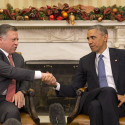President Barack Obama on Friday touted “slow and steady progress” in the fight against Islamic State militants as he committed to increase aid to Jordan, a key ally in the Arab coalition battling the extremists.
The president made the comments in an Oval Office meeting with King Abdullah of Jordan, one of five Arab nations that have participated in U.S.-led airstrikes against the militants in Syria. Obama called Jordan a “rock solid partner” to defeat the Islamic State.
Obama said Jordan is a “small, resource-poor country that consistently steps up” to shoulder its international responsibility. He said he planned to ask Congress to nearly double U.S. annual assistance to Jordan from $660 million to $1 billion.
“The Jordanian military has been working side by side with U.S. and other militaries from around the world in making slow but steady progress, providing assistance to Baghdad, providing assistance to the moderate opposition inside of Syria and to begin culling back some of the gains that ISIL has made,” Obama said. “We recognize that it’s a long-term and extremely complex challenge, but it’s one that we feel optimistic that we’ll be able to succeed in.”
Abdullah thanked the American people for supporting Jordan as he said the country is holding almost 1.5 million Syrian refugees. “It comes at a very difficult time,” Abdullah said.
In an earlier interview with CBS, the king said he’s consulting with other Arab leaders about taking a stronger stand against the Islamic State group and cast it as “a fight between good and evil.”
“This is a war inside of Islam,” Abdullah said. “So we have to own up to it. We have to take the lead. And we have to start fighting back.”
Obama and Abdullah also discussed their efforts to reduce tensions between Israel and Palestine. Jordan’s U.N. envoy said Tuesday she will be trying to get the U.N. Security Council to agree on a resolution before Christmas that would press for a two-state solution to the Israeli-Palestinian conflict.
The push for Security Council action follows the failure of U.S.-brokered peace talks between Israel and the Palestinians led by Secretary of State John Kerry, this summer’s 50-day war between Israel and Hamas, the Palestinian faction that controls the Gaza Strip and the recent upsurge in violence sparked by disputes over Jerusalem’s hilltop complex that is revered by both Muslims and Jews.
“The environment has not been conducive for the sort of peace initiatives that we’d like to see,” Obama said. “But we are going to continue to share ideas, recognizing that ultimately what’s going to be good for the Israelis and the Palestinians is their capacity to live together side by side in peace and security and for Palestinians to have their own state.”

